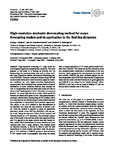High-resolution stochastic downscaling method for ocean forecasting models and its application to the Red Sea dynamics
| dc.contributor.author | Shapiro, Georgy | |
| dc.contributor.author | Gonzalez-Ondina, JM | |
| dc.contributor.author | Belokopytov, VN | |
| dc.date.accessioned | 2021-10-22T10:36:52Z | |
| dc.date.issued | 2021-07-06 | |
| dc.identifier.issn | 1812-0784 | |
| dc.identifier.issn | 1812-0792 | |
| dc.identifier.uri | http://hdl.handle.net/10026.1/18150 | |
| dc.description.abstract |
<jats:p>Abstract. High-resolution modelling of a large ocean domain requires significant computational resources. The main purpose of this study is to develop an efficient tool for downscaling the lower-resolution data such as those available from Copernicus Marine Environment Monitoring Service (CMEMS). Common methods of downscaling CMEMS ocean models utilise their lower-resolution output as boundary conditions for local, higher-resolution hydrodynamic ocean models. Such methods reveal greater details of spatial distribution of ocean variables; however, they increase the cost of computations and often reduce the model skill due to the so called “double penalty” effect. This effect is a common problem for many high-resolution models where predicted features are displaced in space or time. This paper presents a stochastic–deterministic downscaling (SDD) method, which is an efficient tool for downscaling of ocean models based on the combination of deterministic and stochastic approaches. The ability of the SDD method is first demonstrated in an idealised case when the true solution is known a priori. Then the method is applied to create an operational Stochastic Model of the Red Sea (SMORS), with the parent model being the Mercator Global Ocean Analysis and Forecast System at 1/12∘ resolution. The stochastic component of the model is data-driven rather than equation-driven, and it is applied to the areas smaller than the Rossby radius, within which distributions of ocean variables are more coherent than over a larger distance. The method, based on objective analysis, is similar to what is used for data assimilation in ocean models and stems from the philosophy of 2-D turbulence. SMORS produces finer-resolution (1/24∘ latitude mesh) oceanographic data using the output from a coarser-resolution (1/12∘ mesh) parent model available from CMEMS. The values on the fine-resolution mesh are computed under conditions of minimisation of the cost function, which represents the error between the model and true solution. SMORS has been validated against sea surface temperature and ARGO float observations. Comparisons show that the model and observations are in good agreement and SMORS is not subject to the “double penalty” effect. SMORS is very fast to run on a typical desktop PC and can be relocated to another area of the ocean. </jats:p> | |
| dc.format.extent | 891-907 | |
| dc.language | en | |
| dc.language.iso | en | |
| dc.publisher | European Geosciences Union | |
| dc.subject | 13 Climate Action | |
| dc.title | High-resolution stochastic downscaling method for ocean forecasting models and its application to the Red Sea dynamics | |
| dc.type | journal-article | |
| dc.type | Journal Article | |
| plymouth.author-url | https://www.webofscience.com/api/gateway?GWVersion=2&SrcApp=PARTNER_APP&SrcAuth=LinksAMR&KeyUT=WOS:000671001700002&DestLinkType=FullRecord&DestApp=ALL_WOS&UsrCustomerID=11bb513d99f797142bcfeffcc58ea008 | |
| plymouth.issue | 4 | |
| plymouth.volume | 17 | |
| plymouth.publication-status | Published online | |
| plymouth.journal | Ocean Science | |
| dc.identifier.doi | 10.5194/os-17-891-2021 | |
| plymouth.organisational-group | /Plymouth | |
| plymouth.organisational-group | /Plymouth/Faculty of Science and Engineering | |
| plymouth.organisational-group | /Plymouth/Faculty of Science and Engineering/School of Biological and Marine Sciences | |
| plymouth.organisational-group | /Plymouth/PRIMaRE Publications | |
| plymouth.organisational-group | /Plymouth/REF 2021 Researchers by UoA | |
| plymouth.organisational-group | /Plymouth/REF 2021 Researchers by UoA/UoA07 Earth Systems and Environmental Sciences | |
| plymouth.organisational-group | /Plymouth/Research Groups | |
| plymouth.organisational-group | /Plymouth/Research Groups/Marine Institute | |
| plymouth.organisational-group | /Plymouth/Users by role | |
| plymouth.organisational-group | /Plymouth/Users by role/Academics | |
| plymouth.organisational-group | /Plymouth/Users by role/Researchers in ResearchFish submission | |
| dcterms.dateAccepted | 2021-06-04 | |
| dc.rights.embargodate | 2021-10-23 | |
| dc.identifier.eissn | 1812-0792 | |
| dc.rights.embargoperiod | Not known | |
| rioxxterms.versionofrecord | 10.5194/os-17-891-2021 | |
| rioxxterms.licenseref.uri | http://www.rioxx.net/licenses/all-rights-reserved | |
| rioxxterms.licenseref.startdate | 2021-07-06 | |
| rioxxterms.type | Journal Article/Review |


